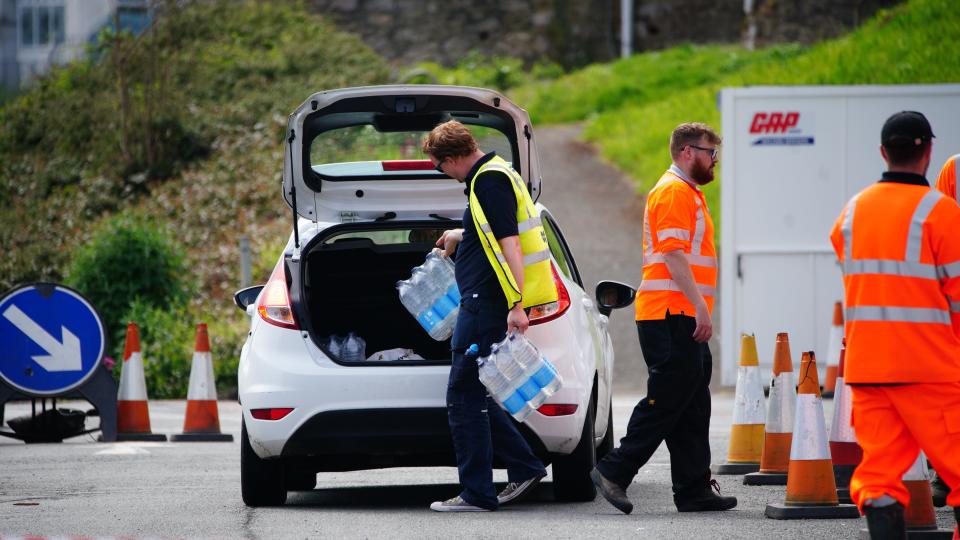South West Water owner hands boss 58% pay hike despite pollution surge

Under-fire water group Pennon has revealed its chief executive saw her pay package jump 58% after picking up a £298,000 shares bonus despite seeing pollution incidents nearly double at South West Water last year.
Pennon’s annual report revealed that chief executive Susan Davy’s total pay jumped to £860,000 in 2023-24 from £543,000 the previous year.
It said she had foregone an annual bonus which would have been worth £237,000 in cash and shares, but still picked up the long-term performance award, which must be held for two years and reinvested in Pennon stock.
The pay details come as the group also revealed in the report that pollution incidents at South West Water soared by 80% to 194 in 2023.
South West Water has also been at the centre of a water contamination crisis in Devon, which is still ongoing nearly a month after it was first detected.
Around 17,000 households in the Brixham area of Devon were last month told by the firm to boil their drinking water after a parasite outbreak in their supply.
The group is paying out around £3.5 million in compensation to affected customers.
A spokesman for Pennon said: “We understand the strength of feeling from our customers and the public around the issues facing the water sector.
“For the second year running, our chief executive, alongside other members of our executive leadership team, have therefore made the personal decision to decline annual bonus for the previous financial year.”
Pennon also said on Monday that one of Deloitte’s former top bosses, David Sproul, was appointed to become its incoming chairman.
Mr Sproul, who was previously global deputy chief executive at Deloitte and is currently chairman of Starling Bank, will replace Gill Rider at the firm’s annual general meeting on July 24.
❗ Customers under the Boil Water notice 🚱
Please keep using your water supply as usual for bathing, flushing the toilet and laundry. This will keep the water circulating through household pipes aiding in the overall flushing process and will help to clean property networks. pic.twitter.com/X4O3rzo4FK
— South West Water (@SouthWestWater) June 9, 2024
Pennon’s report showed that Ms Davy saw her base annual salary rise to £492,000 in April last year from £475,000 in 2022-23 and it was hiked again by 4% to £511,290 in April this year.
The firm has faced heavy criticism over its environmental performance, as has the wider sector as a whole.
South West Water admitted it has “more to do” to tackle sewage spills and pollution incidents, although it also said extreme wet weather was partly to blame, saying 2023 was the fifth wettest on record.
It said in its annual report: “We know there is more to do and we continue to target a further step change in performance.”
The group recently courted controversy after revealing in May that it increased its full-year dividend payout to investors by 3.8%, despite reducing it by £2.4 million after it was handed a record fine for sewage spills at South West Water last year.
❗❗ Upper Brixham, Kingswear and Hillhead update – 9th June 2024
Laura Flowerdew, Chief Customer Officer at South West Water said: “Our teams continue to work day and night to clean our network.
We have identified the source of the contamination and replaced the damaged air… pic.twitter.com/zmCMW7Ab9Y
— South West Water (@SouthWestWater) June 9, 2024
Pennon’s annual results last month showed that underlying operating profits lifted 8.6% to £166.3 million in the year to March 31.
On a statutory basis, pre-tax losses widened to £9.1 million for the year to March 31 from £8.5 million the previous year as it faced a jump in debt costs.
The group – which also owns Bristol Water and recently bought SES Water – saw its debt pile swell to £3.5 billion as of the end of March, up from £3 billion a year earlier.
Gary Carter, national officer of the GMB trade union, accused Pennon of “scandalous behaviour” in increasing Ms Davy’s pay package.
He said: “Does South West Water have no shame?
“Last month increased dividends, now bigger payouts for fat cat bosses.
“This scandalous behaviour has to end – it’s time Ofwat stopped water companies paying big bonuses and paying out huge dividends for such poor performances.”

 Yahoo Finance
Yahoo Finance 